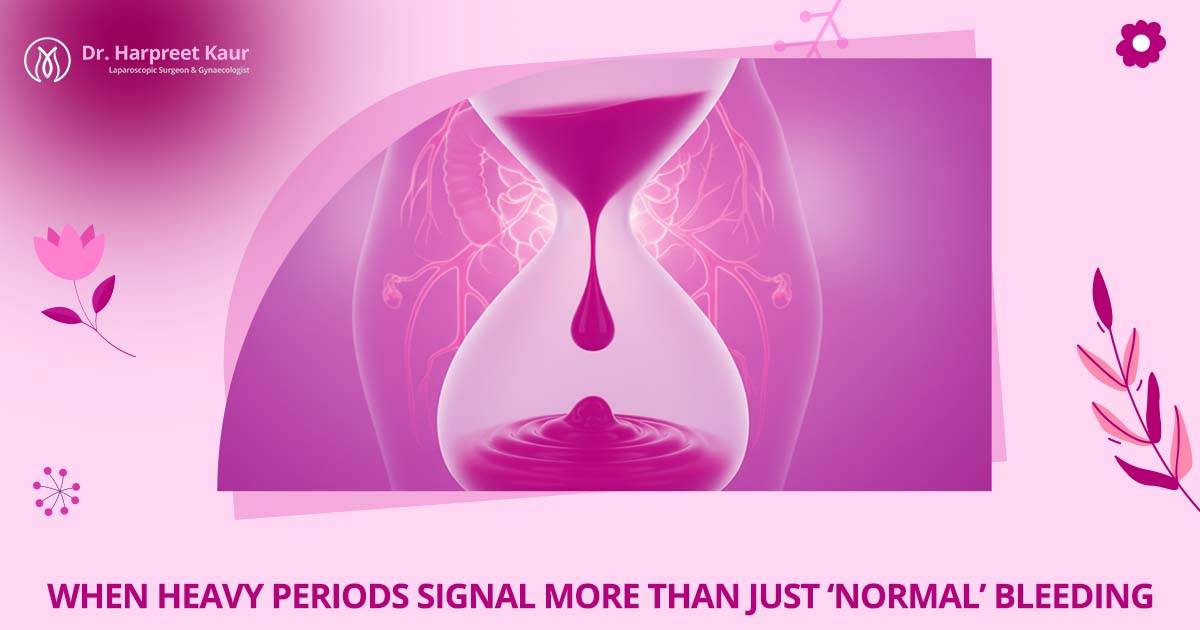Clinic Location
Care n Cure Clinic, Nayapalli, Near Hotel Crown, Bhubaneswar
For Consultation
+91 7008110200
+91 9090910009
Work Hours
Mon - Fri : 05:30 - 07:30
- Home
- About Doctor
- Services
Postnatal care
Gynaecological services
- General Consultatnt
- Adolescent Clinic
- Well Women Clicnic
- Gynaecological Surgeries
- Gallery
- Your Pregnancy
- Training
- Contact
- Feedback
- Blog
- Home
- About Doctor
- Services
Postnatal care
Gynaecological services
- General Consultatnt
- Adolescent Clinic
- Well Women Clicnic
- Gynaecological Surgeries
- Gallery
- Your Pregnancy
- Training
- Contact
- Feedback
- Blog
- Home
- About Doctor
- Services
Postnatal care
Gynaecological services
- General Consultatnt
- Adolescent Clinic
- Well Women Clicnic
- Gynaecological Surgeries
- Gallery
- Your Pregnancy
- Training
- Contact
- Feedback
- Blog
When Heavy Periods Signal More Than Just ‘Normal’ Bleeding

For many women, menstrual flow varies from month to month, but there are times when bleeding feels heavier than usual. While an occasional heavy period might not be alarming, consistently heavy periods could signal an underlying health condition. In medical terms, this is known as menorrhagia. According to Dr Harpreet Kaur, understanding the causes of heavy periods and recognizing the signs of menorrhagia is crucial for timely diagnosis and effective treatment.
What Counts as a “Heavy Period”?
Every woman’s cycle is different, but heavy menstrual bleeding usually involves:
- Soaking through one or more pads/tampons every hour for several consecutive hours.
- Passing blood clots larger than a quarter.
- Periods lasting longer than seven days.
- Needing to wake up at night to change protection.
If these symptoms are present, they may point to menorrhagia signs rather than normal variation.
Common Heavy Periods Causes
1. Hormonal Imbalances: An imbalance in estrogen and progesterone can disrupt the regulation of the menstrual cycle. This often leads to excessive buildup of the uterine lining, which results in heavier bleeding when it sheds.
2. Uterine Fibroids and Polyps: Non-cancerous growths like fibroids or polyps in the uterus can increase menstrual flow and cause clots. These growths can also cause pelvic discomfort and pressure.
3. Adenomyosis: This condition occurs when the endometrial tissue grows into the uterine wall, leading to painful and heavy bleeding. Women in their 30s and 40s are more commonly affected.
4. Bleeding Disorders: Underlying clotting disorders, though less common, can make it difficult for blood to clot properly during menstruation, resulting in prolonged and excessive bleeding.
5. Certain Medications: Blood thinners, anti-inflammatory drugs, or even some hormonal treatments can contribute to heavier menstrual flow.
6. Other Medical Conditions: Thyroid disorders, pelvic infections, or certain cancers of the reproductive tract may also be linked with abnormal bleeding patterns.
Menorrhagia Signs That Shouldn’t Be Ignored
Dr Harpreet Kaur stresses that while every woman may experience different cycles, there are red flags that require medical attention:
- Feeling tired, fatigued, or showing symptoms of anemia.
- Periods interfering with daily activities.
- Needing double protection (pad + tampon) for normal functioning.
- Frequent accidents or leakage despite precautions.
Ignoring these signs can delay treatment and negatively affect overall health.
Impact of Heavy Periods on Health and Lifestyle
Heavy periods are not only inconvenient but can also lead to:
- Iron-deficiency anemia, resulting in fatigue, weakness, and dizziness.
- Disrupted quality of life, including missed work or school.
- Emotional stress and anxiety about managing menstrual flow.
Recognizing menorrhagia signs early allows women to seek treatment and improve both their health and day-to-day life.
Diagnosis: What to Expect at the Doctor’s Office
When consulting a gynecologist, such as Dr Harpreet Kaur, the evaluation may include:
- Medical history and menstrual tracking.
- Physical examination and pelvic ultrasound.
- Blood tests to check for anemia or thyroid imbalances.
- Endometrial biopsy in some cases to rule out precancerous conditions
Accurate diagnosis is key to tailoring the right treatment plan.
Treatment Options for Heavy Periods
1. Lifestyle and Medical Management
- Iron supplements to combat anemia.
- Hormonal birth control methods to regulate cycles.
- Non-steroidal anti-inflammatory drugs (NSAIDs) to reduce bleeding and pain.
2. Minimally Invasive Procedures
- Endometrial ablation (removing the uterine lining).
- Hysteroscopic removal of fibroids or polyps.
3. Surgical Interventions
For severe or persistent cases, surgery such as hysterectomy may be considered as a last resort.
Dr Harpreet Kaur emphasizes that treatment should be individualized, depending on age, fertility goals, and overall health.
Conclusion
Heavy periods should never be dismissed as “just part of being a woman.” Persistent or severe bleeding could indicate menorrhagia and requires medical evaluation. By recognizing heavy periods causes and identifying menorrhagia signs, women can take proactive steps toward better health. With timely consultation from experts like Dr Harpreet Kaur, effective treatments are available to restore balance and improve quality of life.

